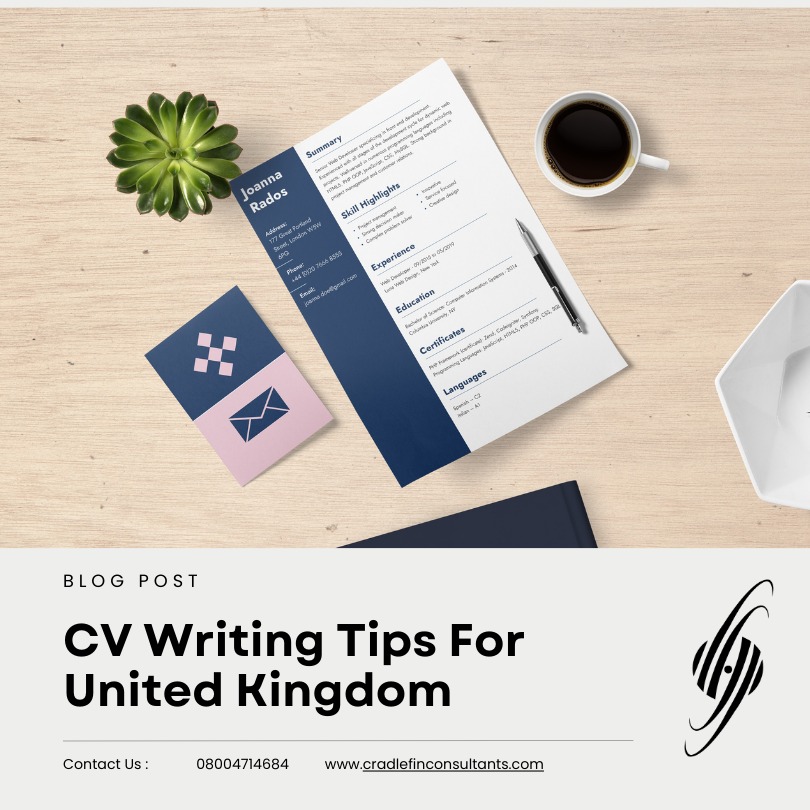Introduction to CV Writing in the United Kingdom
When it comes to job applications in the United Kingdom, a well-crafted CV (Curriculum Vitae) is an essential tool for showcasing your skills, qualifications, and experience to potential employers. In this article, we will explore the key aspects of CV writing specific to the UK job market. From understanding the format and structure of a UK CV to tailoring it for different industries, we will provide you with valuable tips and insights to help you create a compelling CV that stands out from the competition. Whether you are a recent graduate or a seasoned professional, mastering the art of CV writing in the United Kingdom can significantly enhance your chances of landing your dream job.
1. Introduction to CV Writing in the United Kingdom
Understanding the Purpose of a CV
When it comes to job hunting in the United Kingdom, your CV is your best friend. A CV, or curriculum vitae, is a document that showcases your skills, qualifications, and work experience to potential employers. It’s essentially your golden ticket to that dream job interview. So, it’s important to ensure that your CV stands out from the crowd and makes a great first impression.
Importance of Tailoring your CV for the UK Market
One size does not fit all when it comes to CVs. It’s crucial to tailor your CV for the UK job market. Why? Because employers in the UK look for certain things that may be different from other countries. They want to see that you understand their specific requirements and can fit seamlessly into their work culture. So, take the time to research the industry and company you’re applying to and customise your CV accordingly. It’s your opportunity to show them you’re the perfect fit!
2. Understanding the UK CV Format and Structure
CV writing tips for United Kingdom
In the UK, the chronological CV format is widely used and preferred by employers. This means your work experience is presented in reverse chronological order, starting with your most recent job. It allows employers to see your career progression and how your skills have developed over time. So, make sure to highlight your most relevant experience first to grab their attention.
Differences between a CV and a Resume
Wait, aren’t CVs and resumes the same thing? Not quite. While both documents serve the purpose of showcasing your skills and qualifications, there are some key differences. CVs tend to be longer and more detailed, providing a comprehensive overview of your professional life. Resumes, on the other hand, are typically shorter and focused on specific skills and accomplishments. In the UK, CVs are the norm, so make sure to follow the appropriate format.
3. Essential Sections and Content for a UK CV
Contact Information and Personal Details
Before anything else, include your contact information at the top of your CV. This should include your full name, phone number, email address, and professional social media profiles (if relevant). Oh, and don’t forget to double-cheque your email address. Cutehamsterlover92@email.com might not give off the best impression!
Professional Summary or Personal Statement
This is your chance to impress employers right off the bat. Write a concise and compelling summary that highlights your key skills, experience, and what you can bring to the table. But remember, keep it relevant to the job you’re applying for. No one needs to know about your passion for crochet if you’re applying for a marketing role.
Key Skills and Core Competencies
Here’s where you showcase your superpowers. List your most relevant skills and core competencies that align with the job requirements. Be specific, but avoid buzzwords and clichés. Everyone claims to be a “team player” these days!
Education and Qualifications
Include your educational background, starting with your highest degree or qualification. State the name of the institution, the years attended, and any notable achievements or honours. Don’t go overboard with details of your high school role as “hall monitor.”
Work Experience and Employment History
This section is where you detail your work experience, focusing on your most recent roles. Include the company name, your job title, dates of employment, and a brief overview of your responsibilities and achievements. Remember, give them the juicy details, but keep it concise and relevant. They don’t need a play-by-play of every task you’ve ever done.
Achievements and Recognitions
Don’t be shy! If you’ve received any awards, recognition, or made significant achievements in your career, shout it from the rooftops (or at least put it in your CV). Employers love to see that you’ve gone above and beyond in your previous roles.
Additional Sections (e.g., Volunteer Experience, Professional Development)
If you have additional relevant sections, such as volunteer experience, professional development courses, or certifications, include them! These can help you stand out and show that you’ve got more to offer than just a regular nine-to-five.
4. Tailoring Your CV to the UK Job Market
Researching the Target Industry and Job Requirements
Before you start tweaking your CV, do some homework. Research the target industry and job requirements to understand what employers are looking for. This will help you tailor your CV to highlight the skills and experiences that are most relevant and appealing to them. It’s like putting on a fancy dress for a formal event—you want to look the part.
Adapting Language and Terminology
When it comes to language and terminology, be mindful of what’s commonly used in the UK. Adapt your vocabulary to match the industry standards and the company’s culture. No need to use fancy words to impress—just keep it clear, concise, and professional. And remember, a little British humour never hurts! A well-placed joke might just make your CV memorable.
5. Highlighting Skills, Education, and Work Experience in a UK CV
Emphasising Relevant Skills for the Job
When writing your UK CV, it’s crucial to highlight the skills that are most relevant to the job you’re applying for. Consider the specific requirements listed in the job description and tailor your skills section accordingly. Don’t be shy about showcasing your strengths and abilities – this is your chance to shine!
Presenting Education and Qualifications Adequately
In the United Kingdom, it’s important to present your education and qualifications in a clear and concise manner. Include the names of your educational institutions, the dates you attended, and the qualifications you obtained. If you have any relevant certifications or professional development courses, be sure to include those as well. Remember, the goal is to show that you have the necessary credentials for the job.
Effectively Describing Work Experience and Achievements
When describing your work experience in a UK CV, focus on your accomplishments rather than just listing your job duties. Be specific about what you achieved in each role and how your contributions made a positive impact. Quantify your achievements whenever possible – numbers have a way of grabbing attention and showcasing your value. And remember, don’t sell yourself short – be proud of your accomplishments and let them shine!
6. Showcasing Achievements and Personal Branding in a UK CV
Identifying and Highlighting Key Achievements
One way to make your UK CV stand out is by showcasing your key achievements. Identify the accomplishments that are most impressive and relevant to the job you’re applying for, and highlight them prominently in your CV. This could include exceeding targets, receiving awards or recognition, or successfully completing challenging projects. Your achievements demonstrate your abilities and give potential employers a glimpse of what you can bring to the table.
Building and Reflecting Your Personal Brand
Personal branding is about presenting yourself in a memorable and authentic way. Consider what sets you apart from other candidates and find ways to incorporate that into your UK CV. Whether it’s through your writing style, hobbies, or unique experiences, let your personality shine. Remember, employers not only want to know what you can do, but also who you are as a person.
7. Formatting and Design Tips for a Professional UK CV
Choosing an Appropriate CV Template
When it comes to formatting your UK CV, simplicity is key. Opt for a clean and professional template that allows your content to take centre stage. Avoid overly complicated designs or flashy graphics that can distract from the important information.
Organising Information and Using Clear Headings
Ensure that your UK CV is well-organised and easy to navigate. Use clear headings to separate different sections such as contact information, skills, education, and work experience. This makes it easier for employers to quickly locate the information they need and creates a more professional impression.
Using Bullet Points and Action Verbs
Bullet points are your best friend when it comes to presenting information in a concise and readable manner. Use them to list your skills, qualifications, and achievements. Additionally, make use of strong action verbs to describe your responsibilities and accomplishments. This adds impact and shows that you take initiative.
Consistency in Font, Formatting, and Layout
To maintain a professional and polished look, ensure consistency throughout your UK CV. Use the same font and formatting style for all sections, and make sure your layout is clean and easy on the eyes. Consistency creates a sense of coherence and professionalism.
8. Finalising Your UK CV: Proofreading and Tailoring for Each Application
Proofreading for Spelling, Grammar, and Formatting Errors
Before sending out your UK CV, take the time to proofread it thoroughly. Look out for any spelling, grammar, or formatting errors that may have slipped through. These small mistakes can make a big difference in how your application is perceived, so it’s worth the extra effort to ensure everything is perfect.
Customising Your CV for Each Job Application
While it may be tempting to send out the same CV to multiple job applications, it’s important to tailor your CV to each specific job. Take the time to research the company, understand the role, and customise your CV accordingly. Highlight the skills and experiences that are most relevant to the particular job, and make sure your CV aligns with the requirements outlined in the job description. This extra step shows that you are genuinely interested in the position and increases your chances of success.
By following these CV writing tips tailored for the United Kingdom, you can greatly increase your chances of securing job interviews and ultimately landing the job you desire. Remember to always tailor your CV to the specific job requirements and industry standards, highlighting your skills, experience, and achievements effectively. Regularly update and refine your CV to keep it current and relevant to your career goals. With a well-crafted UK CV, you can confidently showcase your qualifications and make a positive impression on potential employers. Good luck with your job search!
FAQ
1. Should I include a photo in my UK CV?
It is generally not necessary to include a photo in a UK CV unless it is specifically requested by the employer. In fact, many companies prefer to have CVs without photos to maintain fairness and avoid any potential biases.
2. How long should my UK CV be?
Ideally, your UK CV should be no longer than two pages. Keep it concise and focused on relevant information. Prioritise the most important details, such as your work experience, education, and skills, to ensure the recruiter can quickly assess your suitability for the role.
3. Should I include references on my UK CV?
It is not necessary to include references on your UK CV. Instead, you can mention that references are available upon request. Prepare a separate document with your references and provide it when specifically asked by the employer.
4. How often should I update my UK CV?
It is advisable to update your UK CV regularly, especially when you gain new qualifications, skills, or work experience. Additionally, tailor your CV for each job application by focusing on the most relevant information. Keeping your CV up to date ensures that it accurately represents your current qualifications and increases your chances of success in the job market.





